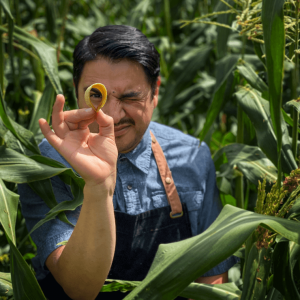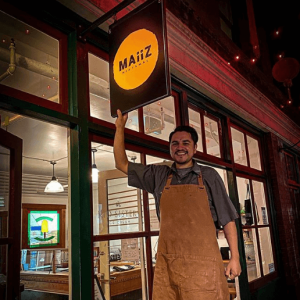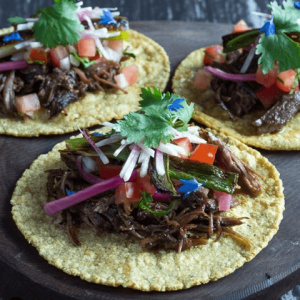MAiiZ Nixtamal Tortillería featured in the Times Colonist!
 Chef Draws From Ancient Traditions in Making Corn Tortillas
Chef Draws From Ancient Traditions in Making Corn Tortillas
- Darron Kloster / Times Colonist 1
Corn is considered a grain, fruit and vegetable. But to Israel Alverez, once one of the top chefs in Mexico City, maize means much more.
It’s about history and culture and the belief that his meso- american ancestors were not only the first consumers and cultivators, but emerged from the corn plant itself.
So it’s not a surprise that Alverez — a Canadian citizen since 2018 — is passionate about his new business, Maiiz, which celebrates corn’s rich past and the process that has made tortillas one of the world’s great food staples.
Alverez makes corn tortillas using nixtamalization, a labour-intensive process that dates back to early Aztec and Mayan cultures. Corn is soaked and cooked in an alkaline solution — usually slaked lime — then washed, hulled and ground into masa dough before being pressed into tortillas.
Nixtamalization enhances the nutritional vitamins and minerals in comparison with raw corn, says Alverez, and the fresh dough is used to make tortillas immediately.
Alverez says the “industrial” methods used today see ground corn dehydrated and made into maseca flour, but the extra processing sacrifices texture and flavour.
“It’s like having fresh potatoes or potatoes out of a box … like having fresh-baked bread from a bakery or processed bread … like freshly ground espresso or instant coffee,” says Alverez. “The difference in quality is very big.”
Alverez says mass production of the tortilla started in the early 1990s after the launch of the North American Free Trade Agreement, when cheap, industrialized tortillas using genetically modified corn started flooding the U.S. and Canadian markets.
In the meantime, nixtamalization was being lost.
He saw his new opportunity in Canada as a way to reinvigorate the ancient process. The pandemic put a crimp in his plans when organic corn from Mexico became more difficult to ship.
But then Alverez found an Abbotsford-based certified-organic farmer who could supply him with a yellow dent variety of corn that works well using nixtamalization.
His tortillas topped with local produce were a resounding success when served at pop-up locations around the city, and sales to local restaurants and grocery stores are increasing by the week.
Eight grocers, including Pepper’s Foods and Michell’s Farm Market, carry the Maiiz brand, while eight restaurants, such as Boom+Batten, The Village, Cafe Mexico and Canoe Brew Pub, use the tortillas to make their own tacos.
The demand is keeping Alverez busy.
He’s sub-leasing an ice cream shop at 10 Fan Tan Alley in Chinatown for the fall and winter months for a retail outlet and production centre, and has hired an employee to assist him.
He’s also waiting for more equipment to arrive from Mexico that will allow him to increase production and expand his sales to the rest of the Island and into the Lower Mainland.
It all leaves Alverez, now 40, feeling grateful.
In 2008, he was called one of the top chefs in Mexico City, riding a high of publicity for his culinary creations at Pujol’s, a Zagat-rated restaurant.
But the fame also brought unwanted attention and an attempted kidnapping for ransom, which was becoming common for anyone with celebrity in one of the world’s largest cities.
“I had to leave the country for my own security,” said Alverez. “It was an overwhelming experience. I did not want to stay, even though my career was going so well.”
He was hired as a chef in Edmonton amid an oil boom in the province, worked there for a decade and earned his permanent residency, then full citizenship. Alverez said he tried marketing his tortillas in the Alberta capital, but it wasn’t catching on. The Island, he said, was a different story.
“It took no time at all to get acceptance from the community,” said Alverez. “People here are interested in many different types of food. There is an interest in culture.”
Alverez will be hosting a special dinner for temporary foreign workers at Michell farms at the end of the month. “I just want to bring them a little taste of Mexico and to thank them for the good job they are doing and the sacrifices they made to come here during quarantine,” he said.

“I want to feel proud about the food I produce, and I want people to feel good about what they are eating!” Chef Israel Alvarez Molina
MAiiZ Nixtamal Tortillas are made from certified organic corn grown in Armstrong, BC and lab-tested to be gluten free. Chef Israel Alvarez Molina’s technique, inspired in the traditional Mesoamerican Nixtamalization process is more than just authentic, providing taste and structure. MAiiZ Nixtamal Tortillas have flavour, aroma, texture and elasticity. When eating a Nixtamal Taco you don’t just taste the corn, you taste the process.
Maiiz.ca • Facebook • Instagram • Twitter • Contact • Subscribe to MAiiZ’ Mail • MAiiZ Gift Card • Publications • MAiiZ Mentors
• Learn more about Chef Israel Alvarez Molina …
• Learn more about MAiiZ …
• Read the Review in the Times Colonist
- “Se siente el sabor de Mexico! I can taste the flavour of Mexico” @gtcanni
- “I love how the tortillas held together perfectly without breaking or getting soggy.” @propitiouspig
SHOP MAiiZ: Nixtamal Tortillas, Masa Dough, Dried Peppers, New Hotness Hot Sauce, Haltwhistle Cheese Curds, Mexican Chorizo and MAiiZ merchandise can be picked up seen days a week from 11am to 6pm at 10 Fan Tan Alley. See map
DELIVERY by TUTTI
ORDER 4kg of Tortillas by Nomadex bicycle delivery!
- MAiiZ at #10 Fan Tan Alley – see map
- Beauregard Cafe & Provisions
- Charelli’s Cheese Shop & Delicatessen
- For Good Measure James Bay
- Michell’s Farm Market
- Peppers Foods
- Rock Bay Market
- The Local General Store
- The Market Garden
- Urban Grocer
- more …
- Be Love
- Boom + Batten
- Cafe Mexico
- Canoe Brewpub
- Hanks *A Restaurant
- Nowhere *A Restaurant
- Saveur Restaurant
- The Village X-press
- The Village Chinatown
- more …
 What exactly is Nixtamalization?
What exactly is Nixtamalization?
- Corn holds the memory of culture, tradition, indigenous practices and history for many in Mexico. Nixtamalization, masa, fresh cooked tortillas; these textures and smells are ingrained within the best culinary experiences and come from a place of memory and authenticity.
- Nixtamalization is the process of chemically transforming dried corn kernels into a dough which is then used in a wide variety of Mexican dishes.
- Dried corn kernels is boiled in an alkaline solution using pickling lime (also known as slaked lime or calcium hydroxide) and then left to soak overnight. When the corn is drained and rinsed some of the outer membrane layer is loosened and rubbed off. Corn that has gone through this process is now called nixtamal, or in some cultures, hominy.
- The wet nixtamal is then ground to a dough using a specialized mill. The result is a silky, slightly elastic fresh “masa” dough that squiggles out the grinder. The masa is shaped into small balls called testalitos and pressed to create fragrant, soft, flavourful tortillas with a unique smell of Mexico!
How does this change the corn?
- The nixtamalization process not only transforms corn structurally, but also nutritionally. Corn on its own is seen as a low source of nutrition, often associated with pellagra, a disease caused by vitamin B3 deficiency common to impoverished communities where the process of nixtamalization was not introduced with corn.
- This issue can be traced back to the colonization of the Americas when corn was taken by Europeans to grow as a crop around the globe, but the nixtamalization process was not. This resulted in widespread disease and malnutrition. Through the process of nixtamalization the calcium in corn is increased as is the quality of protein absorbed by the body. Additionally, phytic acid is reduced making it easier for the body to absorb important minerals unlocked by the alkaline solution used during the nixtamalization process.
What is the cultural importance?
- “When you are an immigrant you go through a lot of stages to find an identity in your new home. The part of my life that I could not find was my diet. I could adapt to a different climate, harsh weather, assimilate into the culture and learn a new language, but deep inside of me nixtamal was missing. There is so much history and culture behind this process which is the foundation of Mexican Cuisine. The aroma, texture, flavour and feeling of a fresh Nixtamal Tortilla doesn’t compare to anything else, it’s like freshly brewed coffee when you’ve had instant coffee all your life. This transformative experience is something that everyone deserves.

















